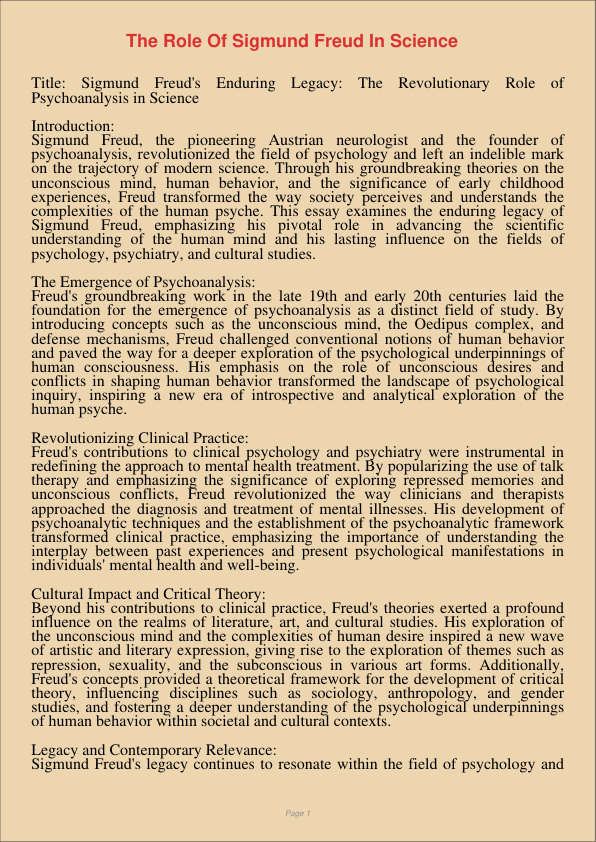
Title: Sigmund Freud’s Enduring Legacy: The Revolutionary Role of Psychoanalysis in Science
Introduction: Sigmund Freud, the pioneering Austrian neurologist and the founder of psychoanalysis, revolutionized the field of psychology and left an indelible mark on the trajectory of modern science. Through his groundbreaking theories on the unconscious mind, human behavior, and the significance of early childhood experiences, Freud transformed the way society perceives and understands the complexities of the human psyche. This essay examines the enduring legacy of Sigmund Freud, emphasizing his pivotal role in advancing the scientific understanding of the human mind and his lasting influence on the fields of psychology, psychiatry, and cultural studies.
The Emergence of Psychoanalysis: Freud’s groundbreaking work in the late 19th and early 20th centuries laid the foundation for the emergence of psychoanalysis as a distinct field of study. By introducing concepts such as the unconscious mind, the Oedipus complex, and defense mechanisms, Freud challenged conventional notions of human behavior and paved the way for a deeper exploration of the psychological underpinnings of human consciousness. His emphasis on the role of unconscious desires and conflicts in shaping human behavior transformed the landscape of psychological inquiry, inspiring a new era of introspective and analytical exploration of the human psyche.
Revolutionizing Clinical Practice: Freud’s contributions to clinical psychology and psychiatry were instrumental in redefining the approach to mental health treatment. By popularizing the use of talk therapy and emphasizing the significance of exploring repressed memories and unconscious conflicts, Freud revolutionized the way clinicians and therapists approached the diagnosis and treatment of mental illnesses. His development of psychoanalytic techniques and the establishment of the psychoanalytic framework transformed clinical practice, emphasizing the importance of understanding the interplay between past experiences and present psychological manifestations in individuals’ mental health and well-being.
Cultural Impact and Critical Theory: Beyond his contributions to clinical practice, Freud’s theories exerted a profound influence on the realms of literature, art, and cultural studies. His exploration of the unconscious mind and the complexities of human desire inspired a new wave of artistic and literary expression, giving rise to the exploration of themes such as repression, sexuality, and the subconscious in various art forms. Additionally, Freud’s concepts provided a theoretical framework for the development of critical theory, influencing disciplines such as sociology, anthropology, and gender studies, and fostering a deeper understanding of the psychological underpinnings of human behavior within societal and cultural contexts.
Legacy and Contemporary Relevance: Sigmund Freud’s legacy continues to resonate within the field of psychology and beyond, underscoring the enduring relevance of his contributions to the understanding of human behavior and consciousness. His emphasis on the significance of the unconscious mind, the exploration of repressed desires, and the role of early childhood experiences in shaping adult personality remains foundational to contemporary psychological theories and therapeutic practices. Freud’s enduring influence serves as a testament to the enduring impact of his revolutionary insights and their lasting relevance in the ongoing exploration of the complexities of the human mind.
「真诚赞赏,手留余香」
真诚赞赏,手留余香
使用微信扫描二维码完成支付
